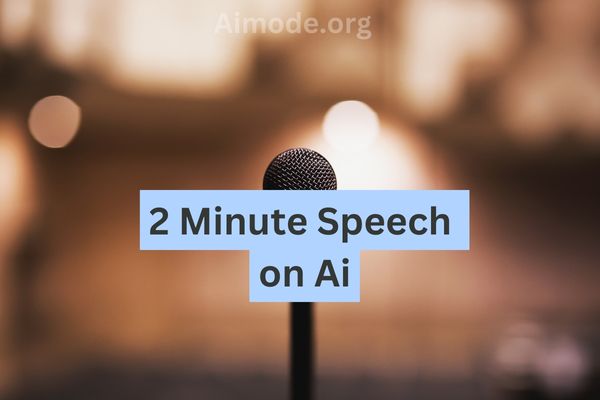2 minute speech on artificial intelligence: Hello friends, Today, In a mere two minutes, we’ll explore the essence of artificial intelligence. Within this compressed timeframe, I aim to ignite a spark of thought, perhaps even kindle a flame of inspiration. So, let’s make every second count, for in this condensed space lies the potential for profound insight and impact. Join me as we delve into artificial intelligence, uncovering its significance and relevance to our lives. Fasten your seatbelts, for this brief journey promises to be nothing short of illuminating.
Also See: 15 Different Types of Ai Ethics
5 Samples for 2 Minute Speech on Artificial Intelligence
Artificial intelligence (AI) stands as the defining frontier of our technological age, reshaping industries, economies, and societies at an unprecedented pace. From self-driving cars to personalized recommendations, AI permeates every aspect of our lives, promising to revolutionize how we work, communicate, and interact with the world.
-
Sample-1
A warm greeting to all the teachers, respected faculty members, and cherished seniors,
Imagine a world where machines not only think but also learn, adapt, and create. Artificial intelligence, or AI, holds the promise of transforming this vision into reality. From revolutionizing healthcare with personalized treatment plans to enhancing education through adaptive learning platforms, the potential of AI knows no bounds. However, as we embrace this technological revolution, we must also confront its ethical implications. Ensuring that AI is used responsibly and ethically is paramount to safeguarding our future.
Also See: 20 Different Types of AI Problems
-
Sample-2
Ladies and gentlemen, artificial intelligence is not just a concept of science fiction; it is a tangible force shaping our world today. From the algorithms powering our social media feeds to the autonomous drones delivering packages to our doorsteps, AI permeates every aspect of modern life. Yet, with this integration comes a responsibility to address its societal impacts. We must strive to mitigate biases, protect privacy, and ensure that the benefits of AI are equitably distributed across all segments of society.
-
Sample-3
A warm welcome to all the notable, respected teachers, seniors, and friends.
In the age of artificial intelligence, machines are not merely tools; they are becoming companions, collaborators, and even competitors. As we witness the rise of AI-powered robots in factories, virtual assistants in our homes, and algorithms making financial decisions, it’s clear that the boundaries between human and machine are blurring. While this convergence offers unprecedented opportunities for innovation and efficiency, it also raises profound questions about the future of work, identity, and the very essence of what it means to be human.
Also See: Different Types of AI Models In Detail
-
Sample-4
From the chess-playing prowess of Deep Blue to the conversational capabilities of Siri and Alexa, artificial intelligence has made remarkable strides in mimicking human cognitive functions. Yet, for all its achievements, AI still falls short in many aspects. The elusive goal of creating a machine with true human-like intelligence, known as artificial general intelligence (AGI), remains a tantalizing yet elusive quest. As we continue to push the boundaries of AI research, we must grapple with the ethical implications and existential risks associated with the pursuit of AGI.
-
Sample-5
As we stand on the cusp of a new era defined by artificial intelligence, we are faced with a profound choice: to shape the future or be shaped by it. The transformative power of AI holds the potential to address some of humanity’s most pressing challenges, from climate change to healthcare disparities. However, realizing this potential requires us to navigate complex ethical, legal, and societal considerations. By fostering interdisciplinary collaboration, promoting transparency, and prioritizing human values, we can harness the promise of AI to build a more equitable, sustainable, and inclusive world for all.
